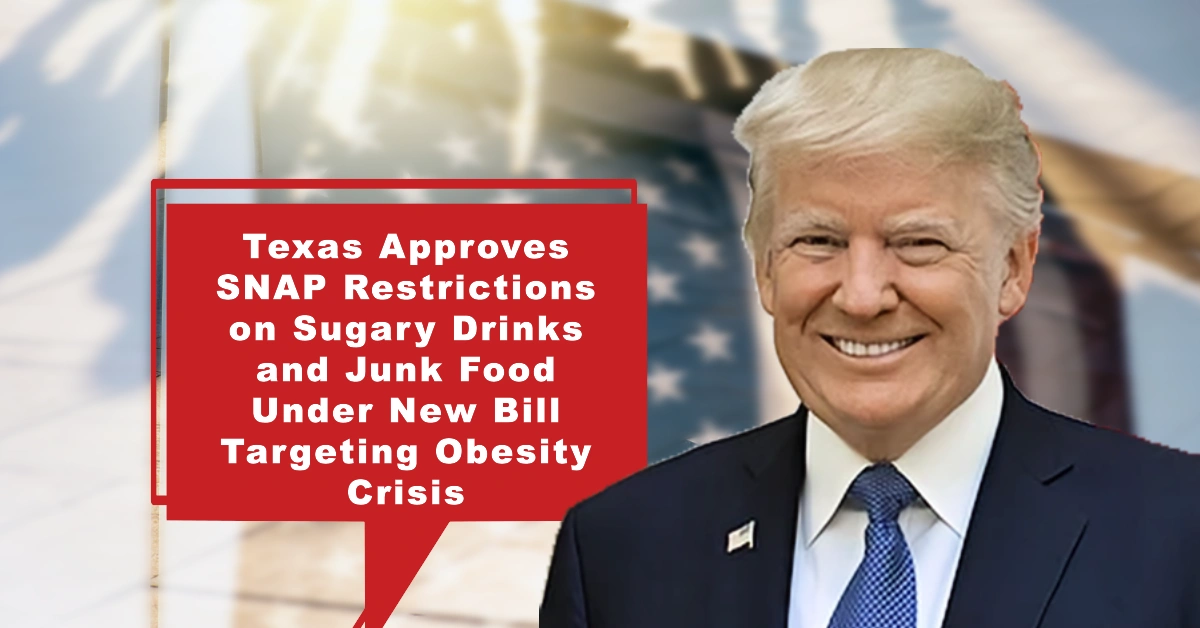Texas Moves to Ban Junk Food from SNAP Program to Tackle Rising Health Concerns
In a bold move that could reshape how government food assistance works in the U.S., Texas has officially approved new restrictions on SNAP (Supplemental Nutrition Assistance Program) benefits. The state’s Senate passed Senate Bill 379, which would prevent SNAP recipients from purchasing sugary drinks and highly processed snacks using their Lone Star Cards.
The proposed legislation, introduced by State Senator Mayes Middleton, is now awaiting final approval from the Texas House of Representatives. If passed, Texas will become the first state in the nation to ban specific unhealthy items from being purchased through SNAP, a federal program designed to help low-income families access food.
Table of Contents
What is SNAP and How Does It Work in Texas?
The Supplemental Nutrition Assistance Program (SNAP) is a federal initiative that helps eligible low-income individuals and families buy food. In Texas, beneficiaries receive their monthly funds via an electronic benefits transfer (EBT) card called the Lone Star Card, which can be used at authorized grocery stores and supermarkets.
Eligibility for SNAP includes those who are:
- Unemployed or underemployed
- Earning a low income
- Over the age of 60
- Living with a disability
- Single parents or caretakers with dependents
The program allows the purchase of a wide variety of grocery items, including:
- Fruits and vegetables
- Meat, poultry, fish
- Dairy products
- Breads and cereals
- Canned and frozen foods
However, sugary beverages, candy, chips, and ultra-processed snacks have also been permitted—until now.
Senate Bill 379: What It Means for SNAP Recipients
Senate Bill 379 seeks to prohibit SNAP funds from being used to buy items that are considered harmful to health, such as:
- Sugary sodas
- Candy
- Packaged cookies
- Snack cakes and chips
- Highly processed foods with low nutritional value
The primary goal, according to Senator Middleton, is to combat diet-related health issues, such as obesity and diabetes, that disproportionately affect low-income communities. More than 3 million Americans currently live with diabetes, and public health officials point to diet as a major contributing factor.
Supporters argue that since SNAP is funded by taxpayer dollars, the government has a responsibility to promote better nutrition and ensure funds are used on foods that align with public health goals.
Critics Say the Law Limits Freedom and Offers No Proof of Effectiveness
Opponents of SB 379 say the measure could unfairly restrict personal food choices of low-income individuals. Advocacy groups claim there is insufficient data showing that SNAP recipients spend a disproportionate amount of their benefits on junk food. They warn that the law could deepen stigma and create logistical challenges for retailers trying to separate approved and banned items.
Critics also argue that food access and affordability—rather than personal choice—are at the core of unhealthy diets among the poor. In many rural and urban areas, access to fresh food remains limited, and processed food is often cheaper and more accessible.
Other States Show Interest as the Nation Watches Texas’ Move
Despite the criticism, the move has sparked national interest. States like Nebraska and Indiana are closely watching Texas and may pursue similar legislation if SB 379 proves effective.
The bill’s supporters see this as a turning point in how food assistance is managed, hoping it will inspire a broader conversation about nutrition, health care costs, and personal responsibility.
A Health-First Approach or a Slippery Slope?
The Texas SNAP food ban reflects a growing tension in U.S. public policy: balancing government assistance with personal freedom. While the bill’s intent is to encourage healthier eating, it raises questions about who gets to decide what’s “acceptable” food—and whether this approach truly solves the root causes of diet-related diseases.
As the Texas House considers the bill’s final approval, one thing is certain: this decision could set a new national precedent for how SNAP and other welfare programs are managed in the years to come.
